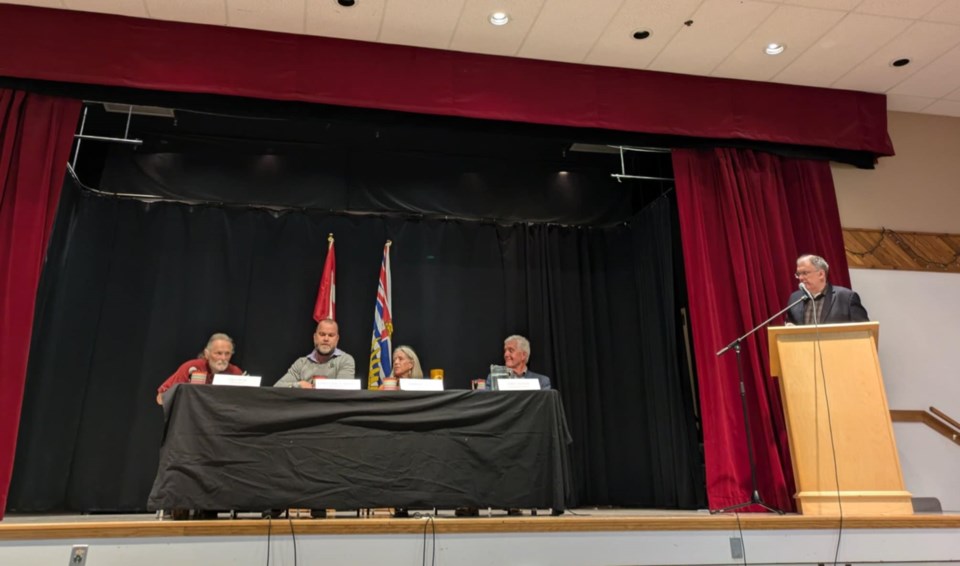“These guys are great. I love them,” Powell River-Sunshine Coast Independent candidate Greg Reid gestured to his competition on stage at Sechelt Seniors Activity Centre Oct. 11. “They’ve become my new family.”
So ended a democratic marathon for riding candidates as they completed six straight nights of all-candidates meetings last week.
(Reid was not at the Sunshine Coast Conservation Society’s Oct. 6 meeting. He says he was excluded from that meeting. The conservation society says, "Based on feedback we received on past forums, we chose to engage only the candidates representing the three political parties" and noted that Reid's answers were included in the Q&As posted to the organization's website.)
The meeting marathon included two forums hosted by Coast Reporter and Sunshine Coast Chamber of Commerce, organized and facilitated by Michael Gurney, on Oct. 9 and 11 in Gibsons and Sechelt respectively.
While Reid’s counterparts didn’t quite mirror his level of conviviality, discussions were largely polite throughout the meetings Coast Reporter attended.
Business growth
In Gibsons, the opening question of supporting business growth on the Coast saw Randene Neill (BC NDP) highlighting the need for affordability for young people and families, so that businesses may have workers, and opportunities in a clean economy.
Chris Moore (BC Conservatives) concurred and added the ferries need improving –– two boats for the lower Coast “we need one-hour sailings, full stop” and resident cards for the upper Coast –– and the highway needs improving. He also promoted consolidating the Coast’s local governments.
Chris Hergesheimer (BC Greens) also stressed the need for government to help affordability, through housing, free public transit, connected communities and safe alternative transportation lanes on the highway, as means of keeping the Coast’s living wage down.
Reid (Independent) spoke to affordability but, as he has done throughout his campaign, touted his plan for direct democracy, having constituents vote on every single issue.
Transitional housing
On the tension between the need for transitional housing or supports for people with addictions and neighbourhoods surrounding these buildings, Reid pointed to agricultural forest community planned living, having people involved in the recovery of clearcuts and healing the land, with doctors and nurses on hand. “Direct democracy will do that for you,” he said.
Hergesheimer acknowledged the fear and frustration surrounding the issue, but put the blame on underinvestment in social safety nets, financialization of housing and a car-centric culture, which all allowed poverty rates to climb. “When we stand behind these buildings, we're standing behind a new system of caring and a support for the journey ahead,” he said.
Moore said transitional housing is needed but questioned the way it’s integrated into the community, specifically with the proposed supportive housing complex in Powell River. He said he’d heard from residents fearful about the proximity of their retirement homes to the building proposed to house people with addictions and that a local association came up with a question template to address before the housing moves forward.
Neill clarified that public safety and crime and homelessness are separate issues, and pointed to the previous week’s Sechelt public safety meeting where they talked about “the reason that there are homeless people in Sechelt and Powell River is because there's not enough supportive housing.” She said they need to provide more supports, which starts with housing.
Other discussions in Gibsons weaved through how B.C. handled the COVID-19 pandemic (including interrogation card-assisted spars over how many nurses lost their jobs with vaccine mandates and safe supply to address the toxic drug crisis), the shíshálh swiya dock management plan and the carbon tax.
Two days later in Sechelt, candidates addressed reconciliation, support for LGBTQ+ communities, long-term care for seniors, water management, reconciliation, BC Ferries and the vacancy tax.
Vacancy tax
On the vacancy tax, Neill said she does not support the vacancy tax on the Coast. She lives in Pender Harbour “where about half of the people who live there are part-timers.” She acknowledged the housing problem and need for workforce housing and pointed to the BC NDP’s housing policies.
Hergesheimer said the BC Greens support a vacancy tax and vacancy control. “Housing is only one piece of the puzzle,” he said. “We want to talk about resilient communities. We want to talk about communities where people live together and you find belonging and connection and reduce social isolation.”
Moore said he doesn’t support a vacancy tax (“This province has got this propensity every time they want more affordable housing or housing they put another tax on. It does the exact opposite.”) and called for the overhaul of the Residential Tenancy Act as it no longer serves landlords, with people refusing to rent out their homes after bad experiences.
Reid said as an independent he’s a “free voice” and pointed to his plan to enact direct democracy in the riding.
BC Ferries
On the question of balancing affordable fares and better service on the Langdale-Horseshoe Bay route, Neill said she would advocate for a second boat starting at the beginning of April and finishing at the end of Thanksgiving.
Moore pointed to the conservatives’ plan to overhaul BC Ferries, with discounts for people who live in ferry-dependent communities, a fleet overhaul and two boats for Route 3, built in Burrard. (In his Oct. 10 announcement, Rustad also said his party would create a BC Ferries Charter to define performance and service expectations.)
Hergesheimer pointed to the privatization of BC Ferries and how it limits provincial decision-making but paired it with a call to appreciate the privilege of sailing “through one of the most beautiful pieces of water to get to one of the most beautiful places of land.”
Reid said he’s pretty lucky as he usually travels as a pedestrian and he loves taking the ferry. He again pointed to his plan of direct democracy.
Recordings of the full meetings can be viewed at candidatequestions.ca.
Election day is Oct. 19.



